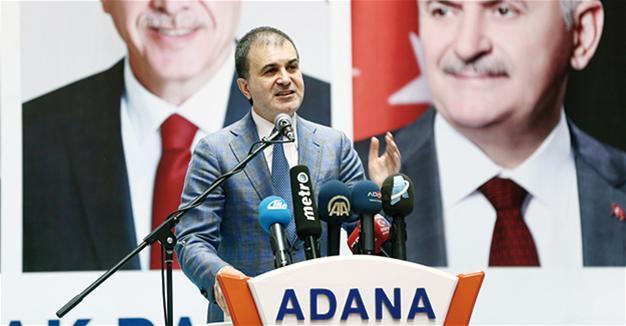Turkey’s EU process a necessity of politics, not romanticism
Turan Yılmaz - ANKARA

A process of reconciliation between Turkey and the European Union to end months of tension is a political – rather than a romantic – necessity, Turkey’s EU minister has said, recalling that both parties are aware of the inextricable relationship between Ankara and Brussels.
“Why should we give up on the EU? The EU is a strategic goal for use but this relationship should be pursued in a fair and objective manner,” EU Minister Ömer Çelik told a group of reporters on May 31 following some of the worst rows ever between the bloc and Turkey.
“What we are doing is politics, not romanticism. What we are concerned with is our national interests, so we’ll look into how we can proceed,” the minister said.
Officials from Turkey and the EU will meet at a political dialogue meeting on June 13 in Turkey in a bid to discuss the short-term road map of the relationship and to determine the areas in which the two parties will work.
Turkey and the EU will discuss setting a new political framework in ties by prioritizing areas of mutual concern. Turkey has also underlined that any process should include the accession process, which would necessitate the opening of negotiation chapters along with other issues such as the migrant deal, visa liberalization and a new customs union.
The decision to launch a new process was agreed at a meeting between President Recep Tayyip Erdoğan and two top EU officials in Brussels on May 25. Relations among Turkey, the EU and some prominent EU countries hit a nadir earlier in the spring due to arguments that occurred before a key referendum in Turkey on April 16.
“A common understanding behoves us to leave those discussions behind. Let’s see what we can produce now. Why should we give up on the EU? We have continued our activities regarding the EU. And they are perfectly aware of why we are in this mood,” Çelik said.
Çelik accused the EU of failing to fulfill its commitments stemming from a migrant deal signed on March 18, 2016, as well as its promises to waive visa restrictions for Turkish nationals and deliver 3 billion euros of aid to Turkey for the resettling of refugees.
The EU is aware that it cannot cut its relationship with Turkey given that latter’s geopolitical importance, Çelik said.
EU accession also remains a strategic goal for Turkey, Çelik said. “This is what is being discussed [in the EU]: Turkey is an indisputable partner. We should listen to them and show progress [in ties]. And what we say is that the EU is a strategic partner but that the relationship should be based on fairness and objectivity.”
 A process of reconciliation between Turkey and the European Union to end months of tension is a political – rather than a romantic – necessity, Turkey’s EU minister has said, recalling that both parties are aware of the inextricable relationship between Ankara and Brussels.
A process of reconciliation between Turkey and the European Union to end months of tension is a political – rather than a romantic – necessity, Turkey’s EU minister has said, recalling that both parties are aware of the inextricable relationship between Ankara and Brussels.